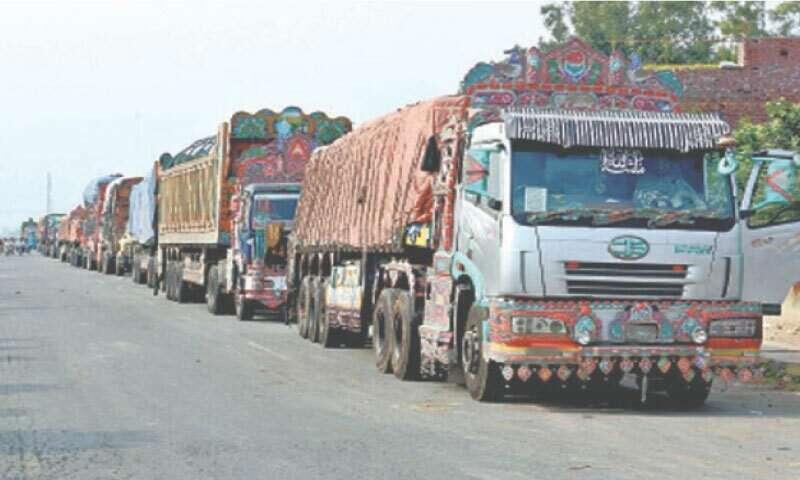
|
Getting your Trinity Audio player ready...
|
Trade Stalled and Millions Lost as Transporters’ Strike Halts Operations
KARACHI: A four-day strike by Pakistan’s goods transporters came to a close early Saturday, but not before it caused massive disruption to export schedules and port logistics, with traders reporting millions in losses and exporters grappling with the fallout from delayed shipments and container pileups.
Jawed Bilwani, President of the Karachi Chamber of Commerce and Industry (KCCI), stated that approximately Rs120 million was lost in terminal demurrage on 12,000 containers that were stuck at various terminals due to the protest. During the strike, between 20,000 to 25,000 export containers failed to make it to the ports on time, creating a backlog that might take up to 25 days to fully clear.
Bilwani advised exporters to ensure they contract transporters who possess proper driving licenses and fitness certifications. He also pointed out that freight charges had doubled during the disruption, adding to exporters’ woes.
Waheed Ahmed, head of the All Pakistan Fruit and Vegetables Merchants, Exporters, and Importers Association, revealed that around 400 containers carrying time-sensitive goods like fruits and vegetables were caught in the transport bottleneck, causing heavy losses. He estimated a potential loss of $300,000 to $400,000 due to spoilage and delays.
Adding to the crisis, another 200 to 250 containers—mainly loaded with potatoes bound for markets in the Middle East and the Far East—were held up at the Punjab-Sindh border due to protests over canal projects. Without proper refrigeration, the chances of spoilage were high, further increasing financial damage.
Ahmed warned that delays and mishandling could severely hurt exporters’ credibility, possibly pushing international clients to turn to more reliable alternatives like India. “Such disturbances do long-term damage to Pakistan’s export reputation,” he said.
Rafique Suleman, former chairman of the Rice Exporters Association of Pakistan, emphasized the financial toll on rice traders, estimating a $16 million loss over the four days. “Pakistan exports rice worth nearly $4 million daily, so just four days of shutdown cost Rs5 to 6 billion,” he remarked, adding that delayed shipments may lead to canceled contracts. He called on the government to explore options for compensation to exporters.
Suleman criticized the lack of swift action by federal, provincial, and municipal bodies. He said the absence of early intervention allowed the situation to worsen and brought rice exports to a grinding halt.
The deadlock was resolved after a meeting between transport representatives and Karachi Commissioner Syed Hassan Naqvi. Following the discussion, the transporters agreed to resume operations and submit weekly reports to DIG Traffic, confirming that only roadworthy vehicles will be used.
Commissioner Naqvi directed the immediate release of all impounded trucks, except those found to be severely unfit for road use. The release of these vehicles would only proceed after owners submit affidavits promising to withhold the vehicles from service until they are approved through proper motor vehicle inspections. The transporters’ union accepted full responsibility for ensuring compliance.
Tariq Gujjar, president of the Goods Transporters Association, stated that a six-month grace period had originally been agreed upon for implementing vehicle safety upgrades—including obtaining fitness certificates—to address the spike in traffic accidents in Karachi.
He criticized the premature crackdown launched on April 12, saying it contradicted the previously agreed-upon enforcement date of May 1, as decided in a high-level meeting chaired by the Sindh chief secretary on April 11.
During that meeting, the authorities had decided to introduce new safety measures such as the installation of cameras on the front and back of vehicles as well as in drivers’ cabins, in addition to mandatory bumpers on both sides of heavy trucks.
Gujjar said that nearly 300 vehicles were seized during the crackdown, which prompted 10,000 to 15,000 transporters to halt operations. This sudden disruption led to losses worth millions each day across various sectors.
As part of the settlement, transporters have now agreed to file monthly progress updates regarding safety compliance and vehicle fitness standards to help prevent future accidents and maintain smoother cargo movement across Pakistan.
FAQs for Pakistani Readers
1. Why did the goods transporters go on strike?
They protested against a premature crackdown on vehicles without valid fitness certificates, which was enforced before the agreed-upon deadline of May 1.
2. How much financial loss did exporters suffer?
Exporters suffered an estimated loss of billions of rupees, including demurrage fees, spoilage of perishable goods, and potential cancellation of international orders.
3. What sectors were most affected by the strike?
Agriculture (especially fruit and vegetable exporters), rice exporters, and traders using ports in Karachi faced the heaviest losses.
4. What is being done to prevent such strikes in the future?
Authorities have agreed on a six-month grace period for transporters to meet safety standards, and monthly reporting will ensure progress is tracked.
5. Will the backlog at ports be cleared soon?
Experts estimate it could take 20 to 25 days to fully clear the accumulated containers at the ports.






